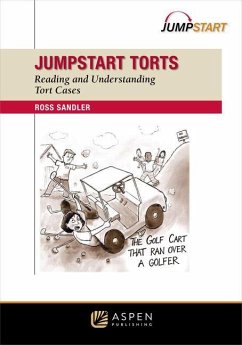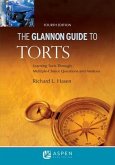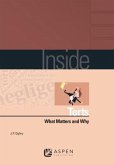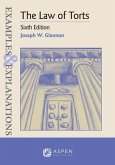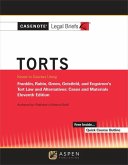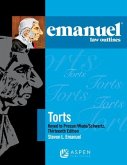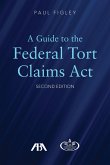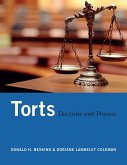JumpStart is a new study aid series covering the first-year course areas. Each title is a short book, roughly 170 pages, that addresses a problem students experience as they navigate their first year courses. Often first year students are expected to learn substantive law by reading judicial opinions without a framework or process to help them comprehend what they are reading. The JumpStart series supplies the context and prepares students to apply the rules in a litigation context. Titles in the series can be used as a general introduction to law school or as an introduction to torts. The books are most useful early in the first semester as well as in orientation courses or as summer reading for students entering their first year of law school. The series will appeal to academic success/support coordinators as well as the course-area professors. Ross Sandler is the series editor. His JumpStart: Torts is the first title in the series. JumpStart: Torts offers a detailed step-by-step approach to the stages of litigation, beginning with stating a theory of the case, moving through determining facts and making motions to receiving the holding of the case. Legal reasoning and the litigation process are taught via numerous judicial opinions with full analysis of each. Judicial opinions and analyses are made comprehensible without in-class explanation in a straightforward, clear, and informal writing style. Class-tested for success, JumpStart: Torts features pedagogical elements that support learning and facilitate use. As with each book in the series, the opening chapter provides a glossary of the terms, idioms, and procedures encountered in reading cases in tort law. Many judicial opinions are accompanied by an artist-drawn "cartoon" that illustrates the conflict or issue of the case. Short, easy-to-read opinions focus on ordinary situations with simple fact patterns that apply settled rules of law and principles. The book ends with a Practice Exam: a clear explanation of how to approach the typical torts essay exam question as well as insight into how professors grade exams. The chapter ends with a practice essay question. Two sample answers are included: a strong answer and a weaker answer. Each answer includes notes that point out where students did well and where they could improve their answers. Features: 1. Detailed step-by-step approach to the stages of litigation * begins by stating a theory of the case * moves through determining fact and making motions to receiving the holding of the case 2. Illustrates legal reasoning and the litigation process * teaches through numerous judicial opinions with analysis 3. Judicial opinions and analyses comprehensible without in-class explanation 4. Straightforward, clear, informal style 5. Class-tested material 6. Pedagogical features 7. Opening chapter 8. glossary of the terms, idioms, and procedures encountered in reading cases
Hinweis: Dieser Artikel kann nur an eine deutsche Lieferadresse ausgeliefert werden.
Hinweis: Dieser Artikel kann nur an eine deutsche Lieferadresse ausgeliefert werden.

